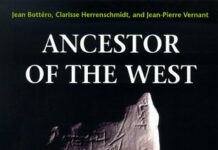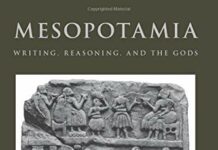
Ebook Info
- Published: 2000
- Number of pages: 208 pages
- Format: PDF
- File Size: 2.80 MB
- Authors: Jean Bottero
Description
With Ancestor of the West, three distinguished French historians reveal the story of the birth of writing and reason, demonstrating how the logical religious structures of Near Eastern and Mesopotamian cultures served as precursors to those of the West.”Full of matter for anyone interested in language, religion, and politics in the ancient world.”—R. T. Ridley, Journal of Religious History”In this accessible introduction to the ancient world, three leading French scholars explore the emergence of rationality and writing in the West, tracing its development and its survival in our own traditions. . . . Jean Bottero focuses on writing and religion in ancient Mesopotamia, Clarisse Herrenschmidt considers a broader history of ancient writing, and Jean-Pierre Vernant examines classical Greek civilization in the context of Near Eastern history.”—Translation Review
User’s Reviews
Editorial Reviews: About the Author Jean Bottéro is director emeritus of L’École Pratique des Hautes Études in Paris. He is the author of many books, several of which have been translated and published by the University of Chicago Press, including Mesopotamia: Writing, Reasoning, and the Gods.
Reviews from Amazon users which were colected at the time this book was published on the website:
⭐This was a gift for a a friend who was taking his Master degree in ancient history. He found the book very satisfying, containing information in one place that would ordinarily be scattered.
⭐This book is actually three essays. Each essay is split into several subject matters and thus becomes a neat secondary source for any student of the subject at hand.The first, by Jean Bottero, is superbly crafted for the general reader who wishes to learn more about, as he says: “History begins at Sumer”. The language does not, unlike Clarisse Herrenschmidt’s second essay, presuppose a detailed knowledge of the subject at hand. Bottero outlines his premise that Mesopotamian culture is a direct descendant of Semite (Akkadian mainly) acculturation of Sumerian culture. He argues that writing evolved as a mnemotechnical device beginning with ideograms and pictograms. He gives a pellucid explanation of the definition of religion, stating it presupposes a belief in the ‘sacred’ or ‘supernatural’. I.e. a higher order that manifests itself in two ways: Either through religiosity – a reverence or love for the order, or centrifrugally – a fear of the order. What is particularly good about Bottero’s writing is he makes statements and then spends some time explaining clearly what the terms of his statement mean. For example, many scholars would state the Mesopotamian religion was not historical and leave it at that. Bottero gives a concise and very understandable definition of the term.The second, by Clarisse Herrenschmidt, far more than Bottero, presupposes knowledge of the subject at hand. Therefore, it is slightly less accessible to the general reader. Given her essay is the longest of the three this is a shame. Nevertheless, Herrenschmidt opens, spending considerable time explaining why proto-Elamic is untranslatable and then tends to run away like any excellent scholar into the intricacies of language and its development from the consonant alphabet to the Greek vowel-using alphabet of eighth century Athens, to the detriment of the general reader who will invariably get lost along the way in the tricky twists and turns of intellectual theorizing. Aside from that, the essay has a long discussion the development of consonants and states that an alphabet is ruled by the rule – one sign = one sound. Not entirely sure I agree with that, as the english alphabet has many variances of sound on its letters. Anyhow, there is an excellent brief history of the technical evolution of writing and its links to social recognition. Herrenschmidt basically states that, in a barbaric society, (which she never really defines) speech = power. From here Herrenschmidt goes on to major discussion on the Mazdean Avesta and from there to Greek. She ends by saying Greek was the language of culture, Aramaic the vernacular, and Hebrew that of the sacred corpus. The concluding section places far too much emphasis on the Greek dropping of the aspirated ‘h’ in eta c.403 B.C; for example, in the statement: “They thus prohibited the privatization of breath through writing, because speech was for everyone and that included the gods.” What exactly does that mean? So, Herrenschmidt’s essay is for the advanced student of ancient writing, not the general reader, particularly given its immense `mathematical’ and `analytical’ approach to the subject.The third, by Jean Pierre Vermont, is much akin to Bottero’s in style and, therefore, far more accessible than Herrenschmidt. The main thrust is to discover the origins of the Greek world given the 4 centuries of literary darkness after the collapse of Mycenae around the 12th century B.C to the appearance of the Greek hegemony in the 9th century B.C. He indicates that Greece moved from a society of the oral to the written and that its religion was governed by two facts: a polis with its own tutelary god and the general pantheon `managed’ from centers such as Delphi. Vermont places (rightly so) much emphasis on the introduction of prose in the 6th century B.C. and its subsequent consequences in that it meant philosophical discourses moved from the realm of the intellectual – much in the same way Herrenschmidt states that Persian cuniform was retained because its complexity gave individuals power over the whole with sacred texts – to the common people. Hesiod’s Theogony is heavily drawn on by Vermont to demonstrate his thesis that the evolution in Greek writing was tied to a shift in social power. What becomes more interesting is the realization that the form of writing was influenced by a maturing need for catography. Vermont moves on to a discussion on the polis and the invention of the political and democracy. There is a good two page opener on the definition of the very word `democracy’ and the section ends up being somewhat semantical as it proceeds from there. Inevitably, as any serious scholar must do, Vermont dives briefly in to the Laws of Solon and thence into Homer.To conclude, any student of ancient writing, reasoning and religion must read these essays. They are precise, clear and extremely good at their given niches. The general reader will find it very informative and Bottero and Vermont can be read by anyone with a rudimentary grasp of the ancient history. Herrenschmidt might become too involved with detailed knowledge of her subject matter.
Keywords
Free Download Ancestor of the West : Writing, Reasoning, and Religion in Mesopotamia, Elam, and Greece 1st Edition in PDF format
Ancestor of the West : Writing, Reasoning, and Religion in Mesopotamia, Elam, and Greece 1st Edition PDF Free Download
Download Ancestor of the West : Writing, Reasoning, and Religion in Mesopotamia, Elam, and Greece 1st Edition 2000 PDF Free
Ancestor of the West : Writing, Reasoning, and Religion in Mesopotamia, Elam, and Greece 1st Edition 2000 PDF Free Download
Download Ancestor of the West : Writing, Reasoning, and Religion in Mesopotamia, Elam, and Greece 1st Edition PDF
Free Download Ebook Ancestor of the West : Writing, Reasoning, and Religion in Mesopotamia, Elam, and Greece 1st Edition

